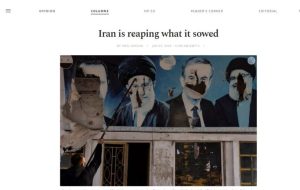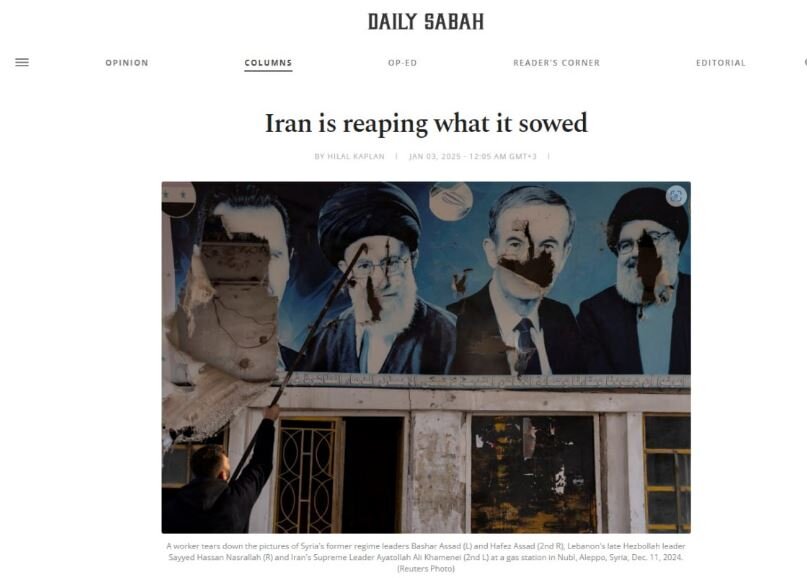Turkey’s foreign policy: anti-Israel posturing, Western alignment, and neo-Ottoman ambitions
TEHRAN – Following the collapse of the Bashar al-Assad government in Damascus, Turkish President Recep Tayyip Erdogan’s supporters and fervent loyalists have been boasting about a major victory for Turkey. In a recent article for Daily Sabah, Hilal Kaplan illustrates what has been at the core of Turkish propaganda in West Asia. Kaplan, in her


TEHRAN – Following the collapse of the Bashar al-Assad government in Damascus, Turkish President Recep Tayyip Erdogan’s supporters and fervent loyalists have been boasting about a major victory for Turkey.
In a recent article for Daily Sabah, Hilal Kaplan illustrates what has been at the core of Turkish propaganda in West Asia. Kaplan, in her article titled “Iran is reaping what it sowed,” claims that Tehran has been pursuing what she calls a “Neo-Persian Empire.” She cites former Iranian officials, journalists, and presidents to support her argument. However, several important and misleading issues undermine her claims.
The individuals Kaplan references as sources are unreliable because they either lacked decision-making authority in foreign policy matters, or even if they were involved in the process, did not have meaningful control. Furthermore, it’s crucial to understand that foreign policy in action cannot be solely extrapolated from statements made by elected officials, which are often influenced by personal interests or political motivations.
Iran as a regional actor
Iran’s post-revolution military strategy has centered around two key objectives: strengthening its domestic defense capabilities and supporting like-minded actors challenging Western imperialism. The development of missile and drone technology, spurred by sanctions that restrict arms imports, exemplifies the former. The latter is demonstrated by Tehran’s backing of the “Axis of Resistance,” which Western analysts sometimes refer to as “forward defense.”
While the fall of Assad in Syria undoubtedly represented a setback for the Axis, it was not a catastrophic one. The Resistance Axis is not solely dependent on Syria; Hezbollah was a significant force well before Damascus became a logistical hub, and Ansarullah in Yemen demonstrates the viability of independent Resistance movements.
Despite being under siege by the Saudi-led coalition, Yemen has successfully thwarted attempts to overthrow the government in Sana’a for almost a decade now. Yemeni forces have meanwhile been launching attacks in the Red Sea and surrounding waters targeting U.S. and Israeli interests. They have also launched successful missile and drone attacks on occupied Palestine, despite being under constant attacks by a U.S.-led coalition.
Meanwhile, Since October 2023, there have been virtually no operations launched against Israel from Syria, because Assad, similar to the current de facto rulers of Syria, did not wish to directly engage with Israel. This is while Western, Turkish, and some Arab media outlets have been portraying Resistance forces as proxies of Iran, not independent states or groups that make decisions on their own. All these examples highlight that the Axis is a network of aligned actors with individual capabilities, not simply a direct extension of Iranian power.
Syria policies of Tehran and Ankara
Since the beginning of the terrorist insurgency in Syria, Tehran has consistently emphasized the Arab country’s national sovereignty and territorial integrity. This policy has not changed, and Tehran has called on all parties to adhere to these principles. Iran has been in contact with Syrian opposition groups for a long time, and its presence in the country was aimed at preventing the advancement of Daesh terrorists and the spread of terrorism throughout the region. Unlike Turkey, Tehran’s presence was not for the purpose of land acquisition, and the government in Damascus retained full authority in all phases of the fight against terrorism. This contrasts sharply with Turkey’s actions which have been seen as interventions that do not fully respect Syrian sovereignty.
The presence of U.S. and Turkish military forces in Syria significantly undermines efforts to protect the country’s territorial integrity and national sovereignty. The Turkish presence, along with its backing of Hayat Tahrir al-Sham (HTS) in the attempt to destabilize the Assad government, has created opportunities for Israel to decimate Syrian military capabilities and infrastructure. In the past few weeks, Tel Aviv has effectively destroyed Syrian naval vessels, sea-to-sea missiles, helicopters, and airplanes, including the entire fleet of MiG-29 fighter jets, along with stockpiles of ammunition in attacks on various military bases. This weakening of Syrian assets serves the strategic goals of both the U.S. and Israel in the region.
While Turkey may have achieved some short-term gains with the fall of Assad, a potential rise in militancy poses a significant threat to its long-term interests. Additionally, the unwavering U.S. support for Kurdish forces in Syria further restricts Ankara’s maneuverability within the country. Furthermore, Saudi Arabia and other Persian Gulf countries have started to exert increased influence in Damascus.
Turkey’s ties with Israel and the U.S.
Kaplan portrays Turkey as a victim of U.S. policies in the region. However, Ankara’s actions have, in fact, been a key factor in enabling Washington’s support for Israel. Despite harsh rhetoric emanating from Ankara against Israel, little practical action has been taken to back up these claims. Economic relations between Turkey and Israel have significantly expanded over the past two decades. According to the Turkish Statistical Institute, bilateral trade volume rose from $1.41 billion in 2002 to $8.91 billion by 2022, with Turkey consistently maintaining a trade surplus. Arguably, the anti-Israel rhetoric is merely a façade intended to secure domestic political gains, while the expansion of economic interests remains the priority.
Following the Israeli attacks on Gaza, this disconnect between words and deeds continues. Despite claims by Turkey that trade with Israel was suspended in protest of the Gaza conflict, investigative journalist Metin Cihan and others have revealed that trade between the two countries has not ceased. Turkish goods have continued to reach Israel, often under the guise of being destined for Palestinians.
The Erdogan government has also adopted a cautious approach to domestic protests against Israel. While demonstrations have erupted across Turkey reflecting public anger towards Israel, the government has strictly controlled these protests. Allowing these protests to occur under close government oversight suggests an intention to prevent uncontrolled civil unrest that could potentially spark broader demonstrations against the government itself.
